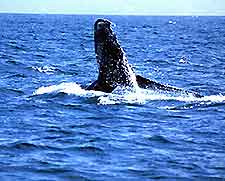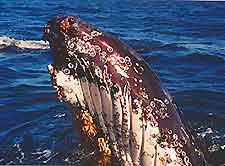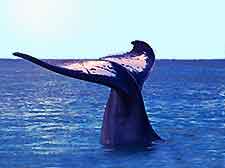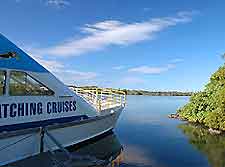Brisbane Whale Watching
(Brisbane, Queensland - QLD, Australia)
Viewing Season

Whale watching along the coastline of Queensland has become a popular attraction for visitors and locals, with a number of whale watching tours available close to central Brisbane. The whale watching season generally runs from mid-June to early November, when the enormous humpback whales pass close to the coastline, in Moreton Bay, Whitsunday, off the Redcliffe Peninsula and Hervey Bay, during their annual migration south in the Indian Ocean, along the Eastern Coast of Australia.
Regular boat trips from Brisbane's harbours allow extraordinary views of the friendly humpback whales, which often travel in large groups and the whale-spotting success rate is extremely high, with many different whale-watching boats sharing their information. Brisbane's whale watching boats vary greatly in size and shape, including large catamarans that take around 300 passengers, with viewing decks, expert commentary and lunch.

Humpback Whales
Humpback whales are one the fifth largest of the great whales and adult humpback whales can measure up to 19 metres / 62 feet, weighing around 40 tonnes. This vulnerable and protected species of whale begins migrating each winter, leaving the Antarctica area at the end of April, to travel to the warmer waters of Brisbane and Queensland in early spring. The first humpback whales to arrive in the waters at Brisbane are usually the newly pregnant female whales, followed by mature males and then mothers with their newly-born humpback whale calves.
Other whale species, including the rare great southern white whale, are occasionally seen in the Brisbane area, not only on the ocean side, but also in the Moreton Bay area, where a number of great southern white whales have been known to spend a day or too, resting close to Brisbane. Also increasing in numbers in the Brisbane area are orca 'killer whales', the natural enemy of the humpback whales.

Boat Tours and Whale Watching Tips
Whale watching tours began in Hervey Bay, close to central Brisbane, in the late 1980s and since then have proved to be one of the most popular tourist attractions in Brisbane and Queensland, during the whale watching season. There are regular boat tours of varying sizes departing from the Redcliffe Peninsula - just 30 minutes to the north of Brisbane, Hervey Bay - the whale watching capital of Australia, located around three and a half hours drive from central Brisbane, and also Moreton Bay and Whitsundays - both nearby Brisbane. Contact the Brisbane Tourist Information office for details about the latest whale watching boat trips in Brisbane. The main whale watching cruises close to Brisbane include:
- Blue Dolphin Whale Watching
Address: Hervey Bay, Queensland (QLD), Australia
- Destination Whales
Address: Hervey Bay, Queensland (QLD), Australia
- Kingfisher I
Address: Hervey Bay, Queensland (QLD), Australia
- Moreton Bay Whale Watching
Address: Moreton Bay, Brisbane, Queensland (QLD), Australia
- Oceania Project
Address: Hervey Bay, Queensland (QLD), Australia
- Quick Cat Whale Watching
Address: Hervey Bay, Queensland (QLD), Australia
- Reefjet Whale Watch
Address: Airlie Beach, Whitsundays, Queensland (QLD), Australia
- Brisbane Whale Watch
Address: Moreton Bay, Brisbane, Queensland (QLD), Australia
- Tasman Venture
Address: Hervey Bay, Queensland (QLD), Australia
- Tasman Venture II
Address: Hervey Bay, Queensland (QLD), Australia
- The Spirit of Hervey Bay
Address: Hervey Bay, Queensland (QLD), Australia
- Volante III
Address: Hervey Bay, Queensland (QLD), Australia
- Volante IV
Address: Hervey Bay, Queensland (QLD), Australia
- Whales in Paradise
Address: Surfers Paradise, Queensland (QLD), 4217, Australia
- Whalesong
Address: Hervey Bay, Queensland (QLD), Australia
- Wildlife Coast Cruises
Address: Hervey Bay, Queensland (QLD), Australia

Giant humpback whales off Brisbane are a common sight from September to November and these 'gentle giants' often migrate in large groups. The Brisbane whale watching boat trips are able to get close enough to the humpback whales to observe them in great detail and numerous photo opportunities are available during the cruises. However, there are strict rules about whale watching in Brisbane and these include no swimming, feeding or touching of the whales. Also, marine vessels in Brisbane should maintain a reasonable distance from the whale and not cause the whale to alter its direction as it migrates for the winter.



 Giant humpback whales off Brisbane are a common sight from September to November and these 'gentle giants' often migrate in large groups. The Brisbane whale watching boat trips are able to get close enough to the humpback whales to observe them in great detail and numerous photo opportunities are available during the cruises. However, there are strict rules about whale watching in Brisbane and these include no swimming, feeding or touching of the whales. Also, marine vessels in Brisbane should maintain a reasonable distance from the whale and not cause the whale to alter its direction as it migrates for the winter.
Giant humpback whales off Brisbane are a common sight from September to November and these 'gentle giants' often migrate in large groups. The Brisbane whale watching boat trips are able to get close enough to the humpback whales to observe them in great detail and numerous photo opportunities are available during the cruises. However, there are strict rules about whale watching in Brisbane and these include no swimming, feeding or touching of the whales. Also, marine vessels in Brisbane should maintain a reasonable distance from the whale and not cause the whale to alter its direction as it migrates for the winter.